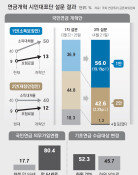Efforts to reforest bare mountains in North Korea
Efforts to reforest bare mountains in North Korea
Posted December. 15, 2014 08:13,
A North Korean media outlet reported in November that North Korean leader Kim Jong Un visited a central tree nursery in Pyongyang and expressed concerns over devastated forests saying Countrys forest resources have decreased while the nation is marching through difficulties and hardship. Forests in North Korean mountains were devastated mostly in the 90s when local residents survived by eating grass roots and barks of trees while others died of hunger, made rice fields by burning forests and produced firewood by cutting trees. It is easy to imagine how dire the situation would be, considering the fact that the supreme leader ordered forest restoration war and said, There is no way to go if we leave forests devastated.
The U.N. Food and Agriculture Organization (FAO) warned last year, The size of forests disappearing every year in North Korea matches with the size of Pyongyang City (approx. 112,000 ha) or 130,000 international standard football fields. Some forecast that it would take 50 years or longer to restore North Koreas forests even by planting trees every year in a field of size of Seoul City. As so many people are starving, trees must be easy target to eat and stave off hunger. The devastated and barren mountains, which were common in the south in 1970s before the tree planting activities, are current sceneries in the north.
President Park Geun-hye recently proposed the "small unification principle" The principle aims to start with small-scale collaboration that can be put into action now such as planting trees and exchange of seeds between the two Koreas. When proposing the Dresden Initiative in March, President Park also called for participation of well-experienced European NGOs and international organizations to help North Korea suffering from poor agricultural production and forest devastation. Although North Korea didnt accept the initiative arguing it is an intent for unification through absorption, the act of planting trees is not related to ideologies.
There is a tree-shaped sculpture printed with a phrase "Planting a tree, Green Korean Peninsula on the road side in front of Dong-A Ilbo headquarters in Gwanghwamun, Seoul. The sculpture was put up by Korea Global Atmosphere Watch Center and other organizations participating in the tree-planting project in North Korea. Some conservative organizations are using the sculpture as a medium to tie strings to hold their tents for sit-in demonstration. It is not a polite behavior to those concerned about barren mountains in the north. Conservative groups must show their class by decent behaviors. The sculpture is not a fancy Christmas tree, but I hope passengers walking on the street around Gwanghwamun turn their eyes to the tree-shaped artwork. If we do nothing about barren mountains in North Korea, it will be sinning to our future generations.







